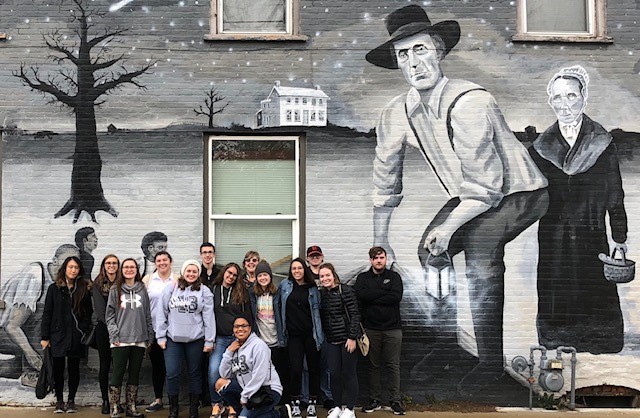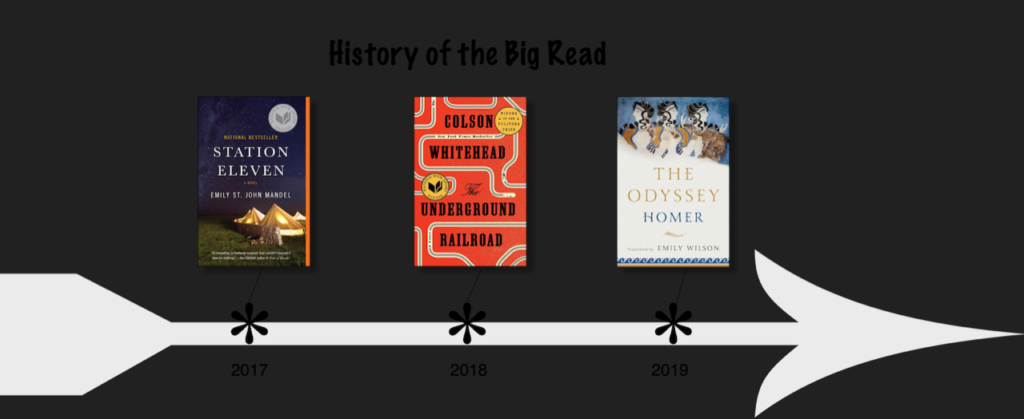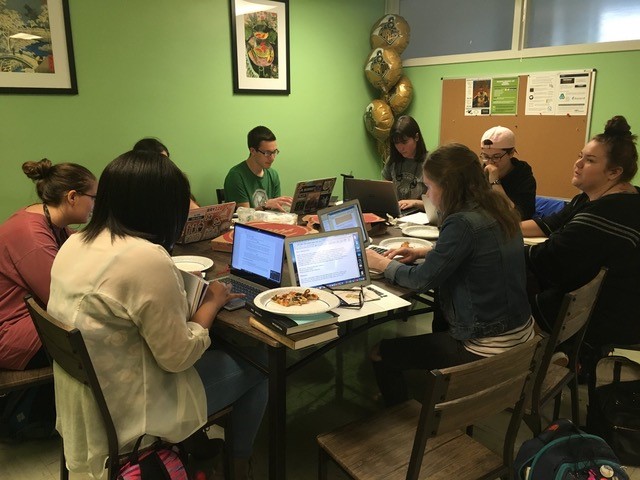
Exploring Learning Communities, Engaging English
May 13, 2019 Julie A Henderson
Learning communities are fundamental to big public universities like Purdue. As one of 11 “high impact” practices identified by the AACU as essential to enriching students’ college education, they encourage deep learning, correlating to high levels of academic challenge, active and collaborative learning, and faculty-student interaction.
Learning communities are integrated experiences; students take two classes together in their first semester, while also participating in residential or extracurricular activities with their classmates. Learning communities are, basically, fast tracks to academic success, assisting new undergraduates’ transition from home and high school to dorm and university; they help students earn better grades, make friends faster, and graduate at higher rates. Learning communities provide smaller class sizes; increased faculty-student mentoring; and opportunities to meet and interact with other students who share similar personal and academic interests. They also make a big campus feel small.
For this reason, each fall the English Department hosts its own learning community called “Engaging English,” open to first-year English majors and Exploratory Studies students. While we encourage the residential component, it is not required. So, students who live in the Honors College, for instance, or who have off-campus living arrangements can still participate. In 2018-2019, we won the Office of Residential Life’s “Real World Experience Award,” recognizing the best learning communities offering introductions to various opportunities within their academic fields.
Let’s take a closer look at the different aspects of our award-winning learning community, and hear from faculty and students who were involved in it.
ENGL 195 Introducing English
“Introducing English” is a 1-credit course (one 50-minute class meeting/week), which initiates students to departmental and college resources, gives them a jump-start on career planning, lets them work on writing skills, and also encourages community through participation in our “Big Read” common read program.
 As our departmental Associate Head Dr. Barbara Dixon says, the “course is unique because we interacted in a deeper way than students in classes normally do—meeting often for dinner during the semester, reading The Underground Railroad [our Big Read for 2018-19], researching the slave trade, and spending an entire day together on a Saturday going to The Levi Coffin House, part of the Underground Railroad network in Indiana.” The biggest lessons that she hopes her students learned were that teamwork on projects is hard work (but also important to their future careers); that reading can be not just informative, but fun; and that faculty are people they can trust if they need help. Students very much enjoyed the experience. Julia, a student in the class, writes: “Dr. Dixon made her classroom feel like a home, and my classmates and I became … a family through the environment she created.” During the semester, the students even suggested creating a “GroupMe” to send text messages and to keep in touch. Dr. Dixon used it to plan a class “reunion dinner” the following semester.
As our departmental Associate Head Dr. Barbara Dixon says, the “course is unique because we interacted in a deeper way than students in classes normally do—meeting often for dinner during the semester, reading The Underground Railroad [our Big Read for 2018-19], researching the slave trade, and spending an entire day together on a Saturday going to The Levi Coffin House, part of the Underground Railroad network in Indiana.” The biggest lessons that she hopes her students learned were that teamwork on projects is hard work (but also important to their future careers); that reading can be not just informative, but fun; and that faculty are people they can trust if they need help. Students very much enjoyed the experience. Julia, a student in the class, writes: “Dr. Dixon made her classroom feel like a home, and my classmates and I became … a family through the environment she created.” During the semester, the students even suggested creating a “GroupMe” to send text messages and to keep in touch. Dr. Dixon used it to plan a class “reunion dinner” the following semester.
Her advice for prospective students? “If you have the chance to join a learning community, take it!” she says, “Try to get out of your comfort zone and go to activities you don’t think you’ll like with people you don’t know!”
The Big Read
 Our annual Big Read is designed to enrich Purdue and Greater Lafayette through the shared experience of reading literature. Each year we select a great book, integrate it into our learning community curriculum, create a calendar of engaging events (including lectures, book group discussions, performances, workshops, author visits) and then provide free copies of the text to undergraduates, high school students, community members, public libraries, and more. Studies show that book ownership contributes to academic achievement, educational, economic development. It’s important for us to reach outside the borders of our campus and the temporal bound-aries of the undergraduate degree. Engagement programs like the Big Read produce demonstrable, positive communal effects, and are essential to Purdue’s mission as a land grant university.
Our annual Big Read is designed to enrich Purdue and Greater Lafayette through the shared experience of reading literature. Each year we select a great book, integrate it into our learning community curriculum, create a calendar of engaging events (including lectures, book group discussions, performances, workshops, author visits) and then provide free copies of the text to undergraduates, high school students, community members, public libraries, and more. Studies show that book ownership contributes to academic achievement, educational, economic development. It’s important for us to reach outside the borders of our campus and the temporal bound-aries of the undergraduate degree. Engagement programs like the Big Read produce demonstrable, positive communal effects, and are essential to Purdue’s mission as a land grant university.
English 202 Engaging English
The second course in the learning community is “Engaging English.” Dr. Robyn Malo, Associate Prof. of English Literature, says that the course teaches students the “basic skills but also the comfort-level and confidence to continue as English majors…We think about storytelling, whose stories we tell, whose stories we elide, and whose we ignore; how our interpretive faculties shape and limit what we are able to understand; and how can we start to get around this difficulty.”
 Of course, Prof. Malo also organized a variety of extracurricular events for her students, like a trip to a play at the Indiana Repertory Theater; poetry readings; meals at the dining halls; meeting authors whose books they read in class; and after-class writing workshops. She even facilitated an impromptu study group during finals week. “Finals week can be overwhelming and stressful,” she says, “and so I thought, ‘Ok, this is a chance to re-connect to the group’…So, I was like, ‘Do you guys want to get together and study so that you don’t have to do it alone, and so that you have a little bit of accountability [to each other] while doing it?”
Of course, Prof. Malo also organized a variety of extracurricular events for her students, like a trip to a play at the Indiana Repertory Theater; poetry readings; meals at the dining halls; meeting authors whose books they read in class; and after-class writing workshops. She even facilitated an impromptu study group during finals week. “Finals week can be overwhelming and stressful,” she says, “and so I thought, ‘Ok, this is a chance to re-connect to the group’…So, I was like, ‘Do you guys want to get together and study so that you don’t have to do it alone, and so that you have a little bit of accountability [to each other] while doing it?”
What did she like best about the learning community experience? “It was fun to see them [in the dining halls].…Hanging out as a group makes learning more possible; I could see that they trusted each other and they trusted me. They knew I liked them and respected them as people. That makes it easier to give and take critical feedback. Students respond to that in a way that helps them learn rather than feel shut down.”
Prof. Malo’s biggest takeaway for her learning community students? “That you can balance learning and hard work with being ok the way you are and not needing to be perfect.”
Conclusion
Our “Engaging English” learning community is an enriching experience for faculty and students alike. One student raved that the experience “is very good at fostering a fun sense of community” and that the course instructors’ “kindness motivates me to perform well.” We consider this high praise, indeed!